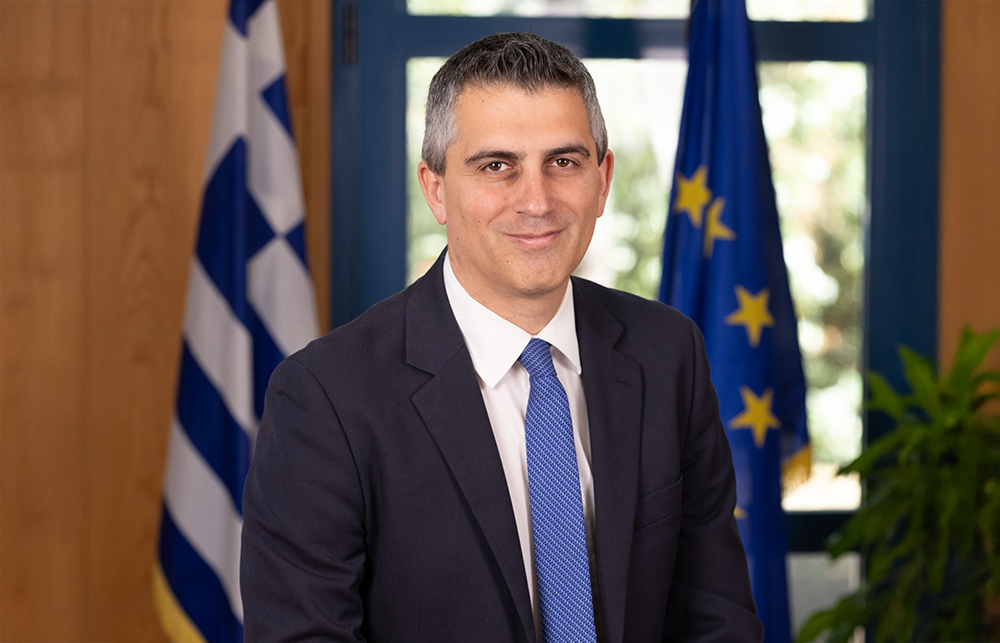
26 Jun Interview with Hon. Christos Dimas, Minister for Infrastructure and Transport, Greece
BN: Minister Dimas, following your appointment after the 2023 train tragedy, what immediate actions are being taken to enhance railway safety in Greece?
Dimas: The draft law grants greater flexibility in decision-making to the new rail administration, allowing it to operate with more private-sector criteria – including the use of innovative technologies across the trains and network, as well as reskilling and upskilling staff.
Alongside the restructuring of the former state-owned entity, we are making significant investments in the rail network. We’re renovating the main Athens–Thessaloniki line and connecting major ports – Piraeus, Thessaloniki, Kavala, and Alexandroupoli in northern Greece. We are also linking our rail system to ports in Bulgaria and Romania, effectively connecting the Aegean and Black Sea. This creates an alternative southern route for cargo entering central and Western Europe. Transforming the Rail Authority and upgrading infrastructure remain top government priorities.BN:
The Thessaloniki Metro has recently become operational. How does this project contribute to urban mobility and economic development in the region?
Dimas: One of Greece’s unique challenges, and advantages, is that nearly every construction site uncovers antiquities. While some see this as a complication that delays infrastructure, it is in fact an asset. The Greek state has struck a strong balance between preserving antiquities and advancing public works – not just in the Thessaloniki Metro, but nationwide. The Thessaloniki Metro is arguably the most beautiful in the world; each station is either an archaeological site or a museum. Combined with its innovative, driverless technology, the project demonstrates how we’ve integrated public infrastructure with heritage preservation and modern design. The metro has already reduced traffic congestion by 15%. With the planned 2026 extension, adding five stations in the city’s eastern part, we expect ridership to increase significantly, further enhancing its impact.
BN: Are you already working on other sections of the metro elsewhere in the country?
Dimas: Yes. In Thessaloniki, we are extending the metro with five new stations. In Athens, we are developing the fourth metro line – a major infrastructure project currently under construction. Work is progressing across multiple areas of the city. Expanding the metro network in Athens is also a top government priority.
BN: How would you describe Greece’s current position in terms of ease of doing business, and what steps is the Ministry taking to reduce red tape and support business growth?
Dimas: Improving ease of doing business is a top priority – not only for our Ministry but for the entire government, including the Prime Minister. This focus is reflected in Greece’s steady rise in the World Bank’s Global Competitiveness Report. We’ve established Enterprise Greece within the Ministry of Foreign Affairs to attract foreign direct investment and lead international outreach. For example, we’ve launched joint initiatives with the UAE involving infrastructure, transport, innovation, startups, universities, and culture. Our goal is to build on these efforts and increase both UAE investment in Greece and vice versa. There’s a strong diaspora link, especially from the past 15 years, and we are working closely with the UAE government to expand cooperation across multiple sectors. The relationship is built on solid foundations, and we’re committed to strengthening it.
BN: How is the Ministry leveraging technology to enhance infrastructure planning and maintenance?
Dimas: Greece has made tremendous progress in digitalization over the past few years. We’re working to digitize all public sectors, including making all transactions between citizens, companies, and the state fully digital within the transport sector. In infrastructure, a major priority is digitalizing public procurement so that tenders can proceed much faster than before. We’ve already made significant strides, but our goal is to reach 100% digitalization. This will make public procedures not only faster but also more transparent.
BN: In terms of funding, how is the Ministry utilizing EU resources to support infrastructure development?
Dimas: We’re drawing on a combination of national budget resources and co-financing programs from the European Union. Attracting private investment in public infrastructure is also a government priority. In addition, we’ve secured loans from the European Investment Bank to support our programs. This blend of financial instruments – public, EU-backed, and private – is the model we’re using to move forward with the infrastructure and transport projects currently underway.
BN: What collaborations are underway with the private sector partners in the UAE to advance infrastructure projects?
Dimas: We have many ongoing public-private partnerships across Greece in infrastructure and transport – covering highways, dams, and potentially the rail sector, which we’re open to exploring. The UAE has made remarkable progress in infrastructure over the past two decades, and we’re actively discussing how to deepen collaboration. We regularly exchange best practices in both directions, Greece to the UAE and vice versa. Thanks to our strategic location in southeastern Europe – at the crossroads of Asia, Africa, and Europe – and full EU and Eurozone access, Greece offers strong advantages as a partner in regional infrastructure development.
BN: Looking ahead, what are your strategic priorities for Greece’s infrastructure and transport sectors, and what are the biggest challenge you might be facing?
Dimas: Accelerating the delivery of major public infrastructure projects is one of our top priorities. Greece is effectively a construction site right now, with large-scale works underway across the country. Rebuilding the national rail network is critical – we want it to be safe, fast, and comfortable for passengers, and efficient for cargo. A new draft law will give the Hellenic Railways Organisation (OSE) more operational flexibility. In aviation, we’re launching a major effort to replace our fleet with zero-emission buses – both electric and hydrogen-powered.
Infrastructure and transport are pillars of the “new Greece”: a country moving beyond the financial crisis, achieving EU-leading growth, breaking records in exports, R&D, public debt reduction, and unemployment. Our infrastructure strategy reflects this shift – we’re not just catching up with our European peers, we aim to leapfrog them. With innovation and investment, we’re building a system that will drive long-term national growth.
BN: What is your final message to our readers?
Dimas: Greece offers outstanding business opportunities and a culture that shares many similarities with that of the United Arab Emirates. You’ll find talented individuals here, ready to deliver innovative, high-impact projects that are mutually beneficial.


No Comments